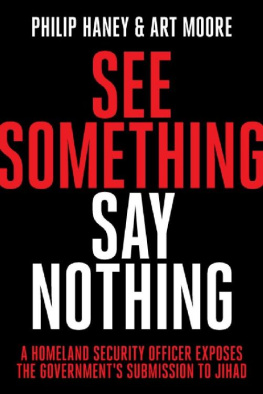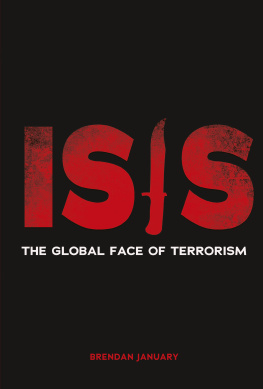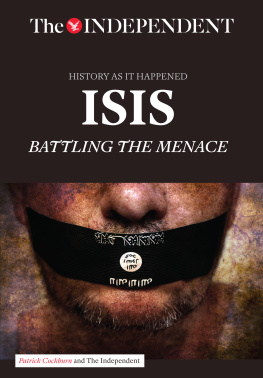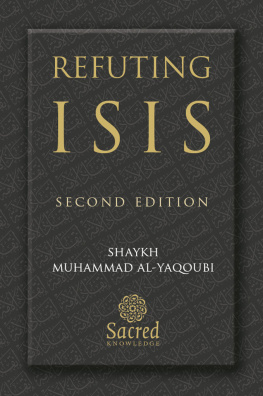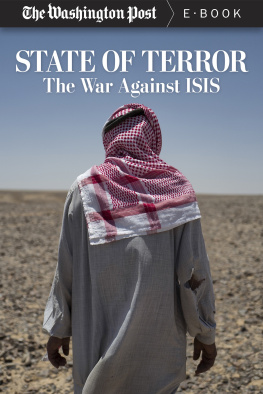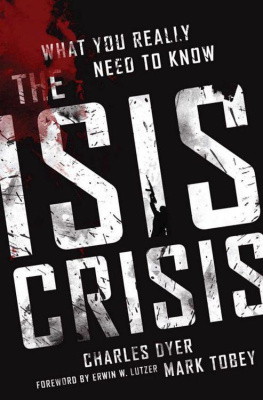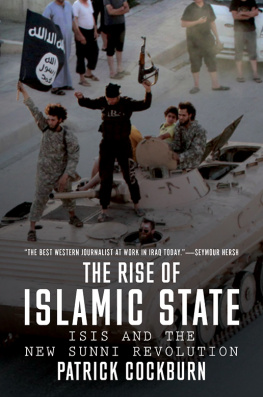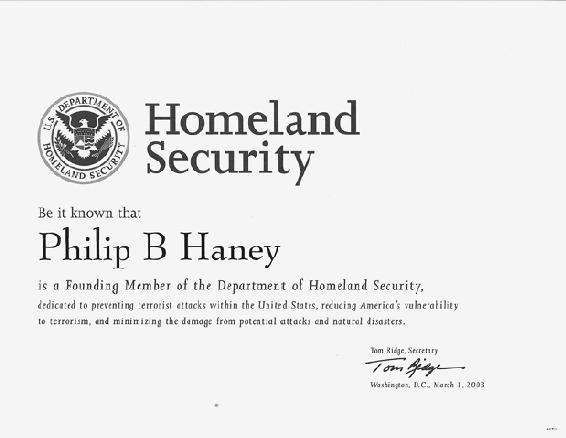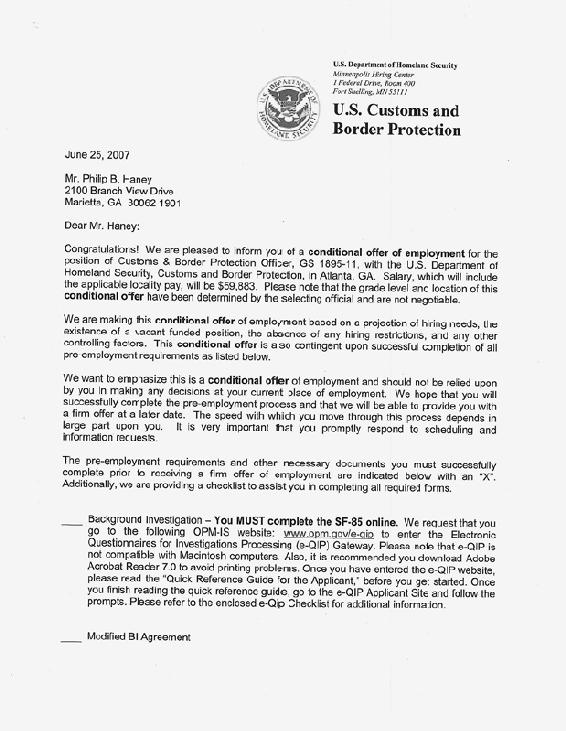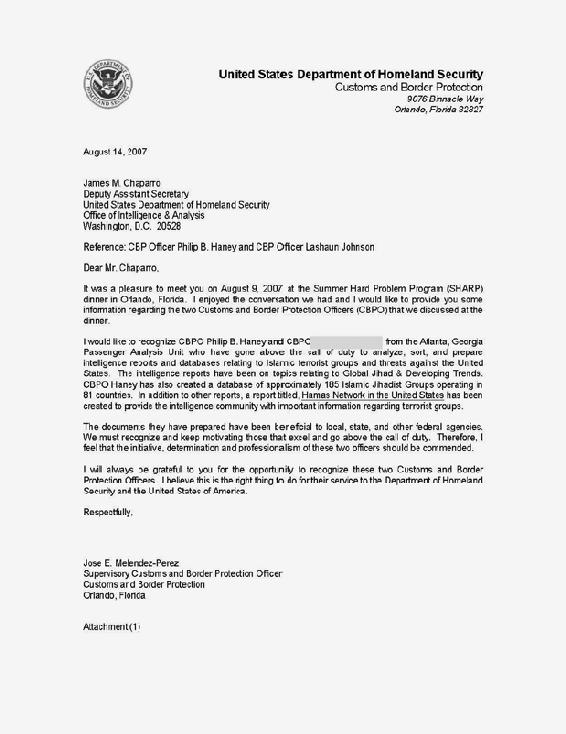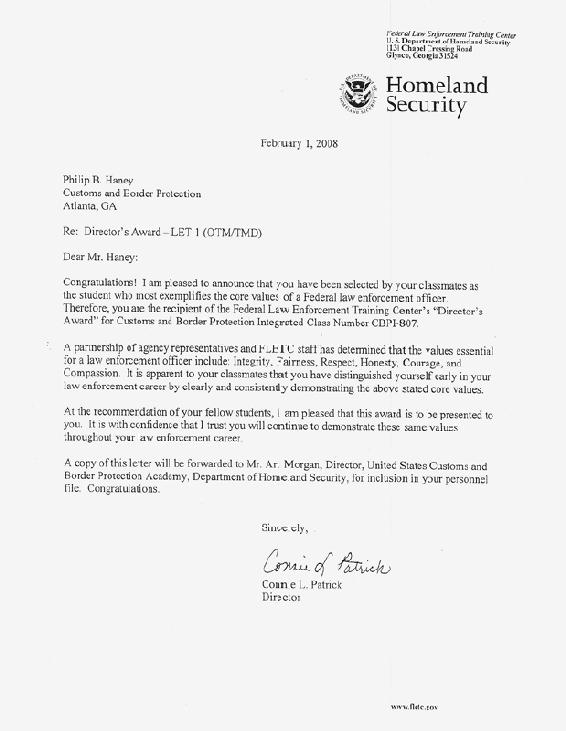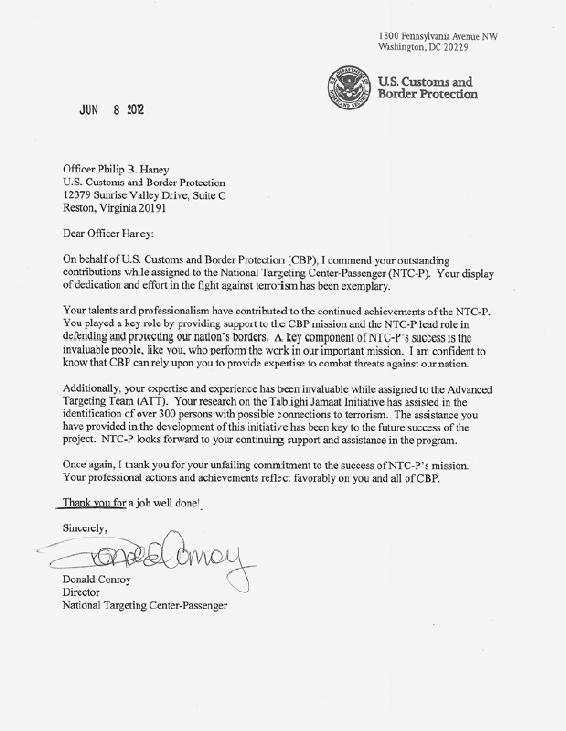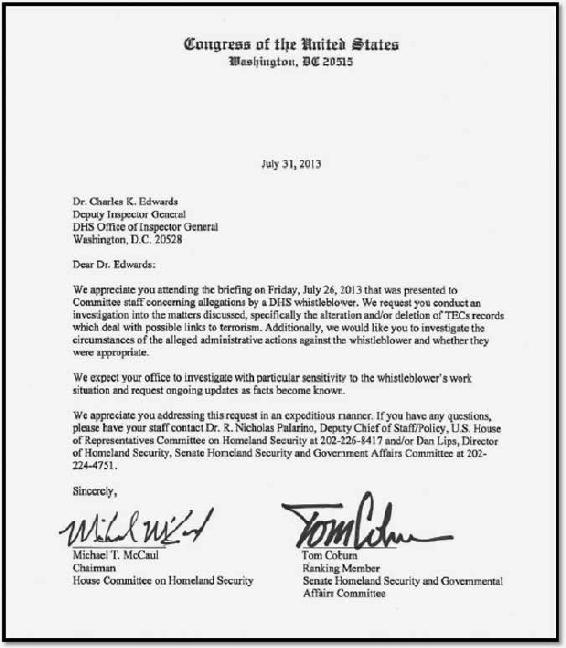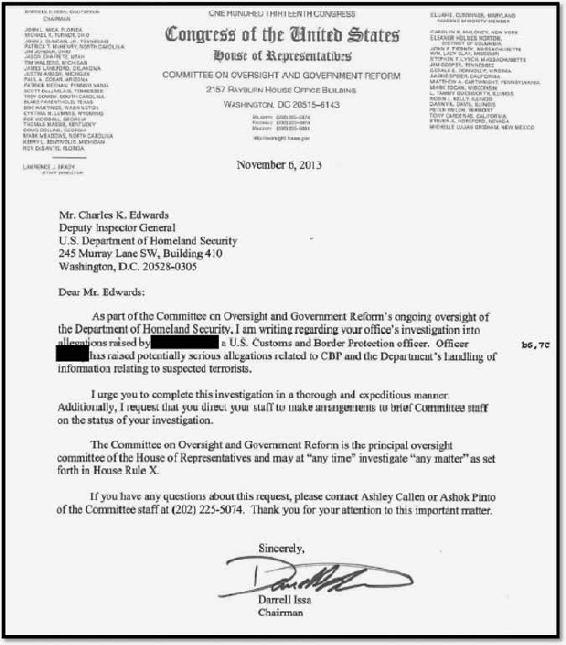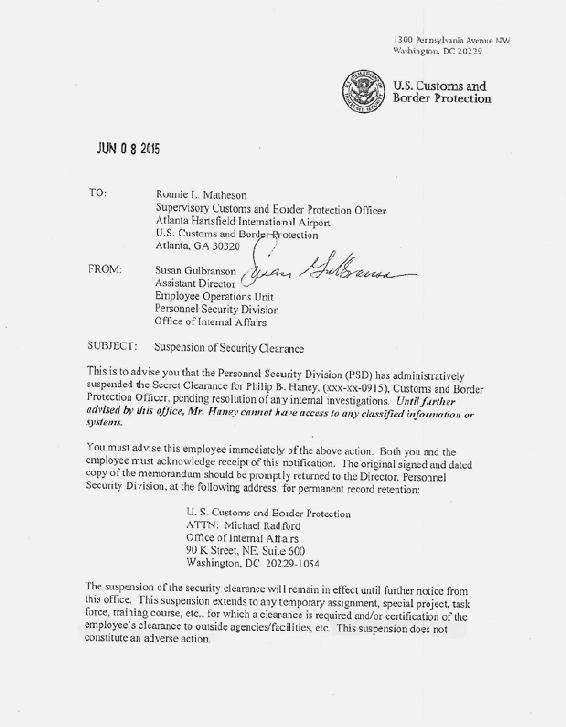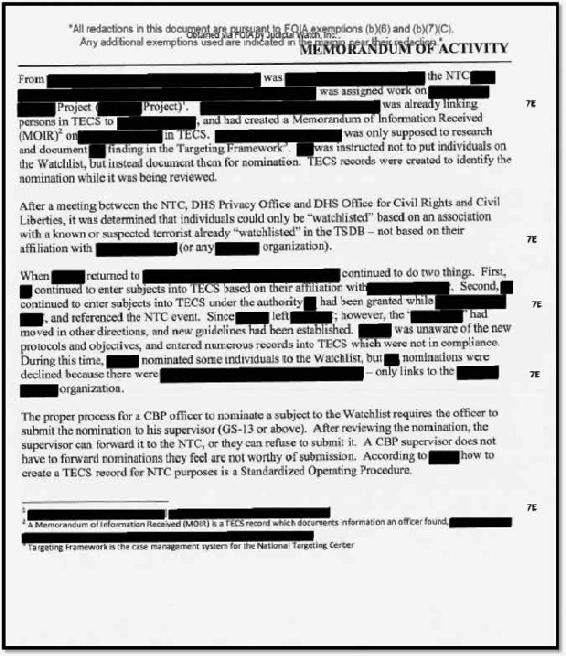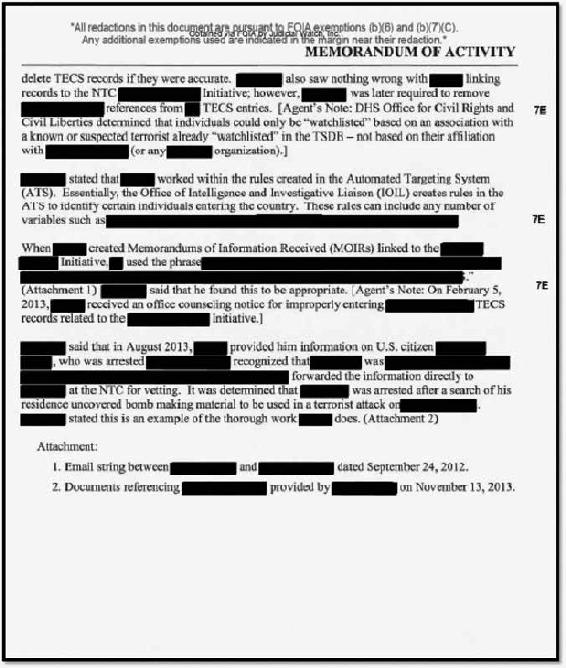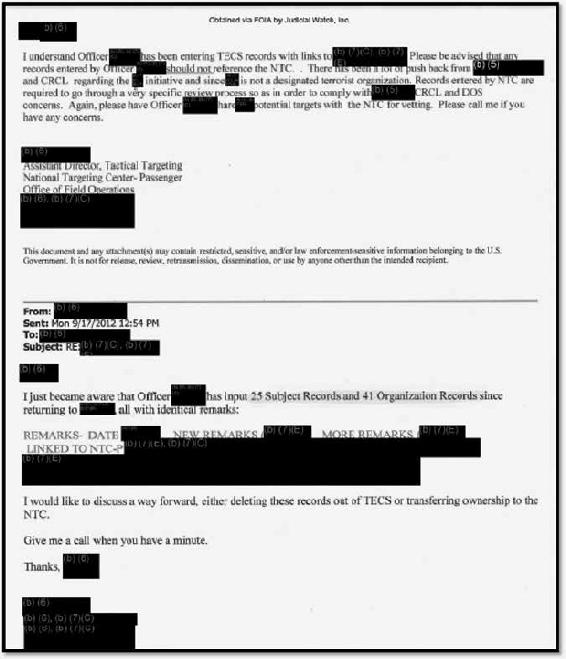APPENDIX
Department of Homeland Security founding member certificate signed by the first secretary, Tom Ridge.
Employment offer to Philip Haney for conversion from agricultural officer to Customs and Border Protection officer.
CBP supervisor recognition of Philip Haneys service and devotion and request for higher commendation from DHS.
The Directors Award is the Federal Law Enforcment Training Centers highest commendation.
Commendation from the director of the National Targeting Center-Passenger of Philip Haneys expertise in counterterrorism and his outstanding contribution to the NTC-P.
US Rep. Michael McCaul, chairman of the House Committee on Homeland Security, and US Sen. Tom Coburn, chairman of the Senate Homeland Security and Governmental Affairs Committee, urge the deputy inspector general to investigate Philip Haneys allegations of DHS misconduct.
Request from US Rep Darrell Issa to the DHS deputy inspector general to complete his investigation into Philip Haneys allegations of DHS misconduct.
Notice of administrative suspension of Philip Haneys Secret Clearance, which did not constitute an adverse action.
The following documents obtained through the Freedom of Information Act show that it was the DHS Office of Civil Rights and Civil Liberties, along with the State Department, that moved the Tablighi Jamaat Initiative in other directions, as recounted in chapter 1.
FROM JEDDAH TO SAN BERNARDINO
I stood at a tinted window on the second floor of the Customs and Border Protection agencys National Targeting Center (NTC) headquarters on March 27, 2012, on the outskirts of the nations capital as a State Department van approached the entrance.
From the outside, the NTC building in Reston, Virginia, is a nondescript, dark-paned, office-park structure. On the inside, it looks like a scene from a Hollywood spy thriller: an intelligence nerve center of earnest and focused faces lit by the glow of giant TV screens and hundreds of computer monitors.
Established shortly after the 9/11 attacks, the NTC provides background and actionable intelligence in real time to frontline Department of Homeland Security (DHS) officers trying to stop people who pose a threat to the nations security from entering through more than 350 air, land, and seaports across the country.
As a Customs and Border Protection officer from Atlanta since the formation of DHS in 2003, I was on a temporary-duty assignment at the NTC that had begun in November 2011. I was now working with the Advanced Targeting Team, the centers top unit.
The white State Department van pulled up to the curb, and seven men in black suits filed out. Up the stairs came an entourage of lawyers, along with three executive-level officials, who had come in a separate vehicle.
Assembled at a long oval table with my NTC colleagues, the officials wanted to talk about an initiative I helped launch, partly in response to a request by members of Congress to plug security holes in the Visa Waiver Program, which allows nearly 20 million people from thirtyeight friendly countries to enter the United States without a visa.
The officials apparently had concerns about our effort, which in government vernacular is never a good sign.
The project focused on vetting members of a worldwide Islamic group with more than 70 million members, known as Tablighi Jamaat.
Derived from the Deobandi movement in India, Tablighi Jamaat, or the party of the promoters, trains and sends out Islamic missionaries in groups of two, three, or more who go door to door, visiting mosques and encouraging their Muslim brethren to live the strict, ascetic lifestyle of Islams prophet, Muhammad.
The NTCs Tablighi Jamaat Initiative was a distinct investigative effort that connected members of the movement to terrorist organizing and financing at the highest levels, including Hamas and al-Qaeda. It had resulted in twelve hundred law-enforcement actions, including visa refusals, visa-waiver cancellations, and denial of entry. All of this happened in just the first nine months of the initiative, which had been approved by the DHS chief counsel in August 2011.
Observing from my seat in the far corner of the room, I never said a word during the entire meeting, but I listened carefully while taking notes in shorthand.
Were here today because we just want to make sure were all on the same page on this issue. We know that members of Tablighi Jamaat are fundamentalists, but theyre not terrorists, a State Department official insisted.
We look really closely at the Tablighi Jamaat people [who apply for visas], but we cant stereotype them, he explained. Just because they belong to an Islamic group, it doesnt mean they are terrorists themselves.
He acknowledged vetting them is a challenge but concluded, We all know the group is way too big just to say that membership alone makes them ineligible for a visa. He then disclosed that human rights, the State Departments Civil Rights Division, is working with Immigration and Customs Enforcement on the issue.
In a PowerPoint presentation we had prepared to make our case, a colleague of mine pointed out that US foreign consulates had approved only 25 percent of the requests for visas made by individuals affiliated with Tablighi Jamaat.
There was total silence in the room for some ten seconds.
It wasnt Customs and Border Protection that was rejecting Tablighi Jamaat visa applicants at a rate of 75 percent. Instead, as we showed them, it was their own consulate officers who didnt have confidence in these people.
One of the State Department lawyers raised his hand.

